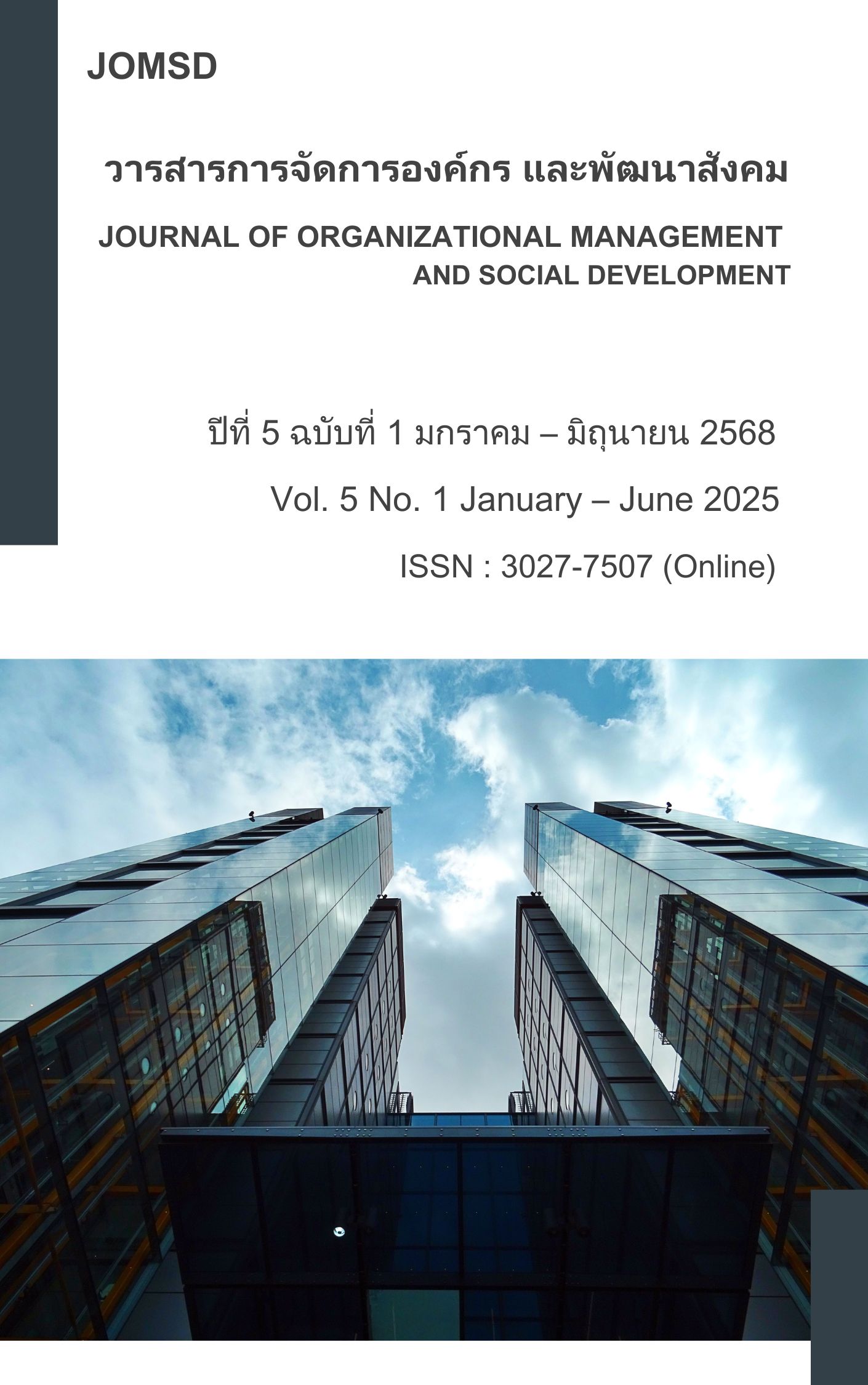Human Capital Development of Supervisors in Coating Industrial
Main Article Content
Abstract
This article aims to study the development of human capital in the digital era among supervisors in coating industry factories, which is a crucial component of production in various industries such as automotive, electronics, and construction materials. The transition into the digital age has influenced work patterns and the essential competencies required of supervisors. Therefore, human capital development must focus on technological skills, change management, and leadership in a digital context. This article presents topics including innovation, human capital development, human capital development in the digital era for supervisors, and human capital development in the digital era for supervisors in the coating industry. The results of the study indicate that multidimensional human capital development can enhance organizational competitiveness and improve operational efficiency in the coating industry.
Article Details
References
กนกกาญจน์ พวงเพ็ชร, สุนิตดา เทศนิยม, ธีรพล กาญจนากาศ และสมคิด ดวงจักร. (2568). การบริหารทรัพยากรมนุษย์ที่มีผลต่อประสิทธิภาพการบริหารงานของสำนักงานเทศบาลตำบลบางใหญ่ จังหวัดนนทบุรี, Journal of Spatial Development and Policy, 3(2), 57-68.
กรมพัฒนาฝีมือแรงงาน. (2564). แนวทางการพัฒนาทักษะแรงงานในยุคดิจิทัล. กรุงเทพฯ: กระทรวงแรงงาน.
กรมอนามัย. (2565). การพัฒนาทรัพยากรมนุษย์ในยุคดิจิทัล. สืบค้นจาก https://person.anamai.moph.go.th.
กองยุทธศาสตร์และแผนงาน สศอ. (2565). กลยุทธ์การส่งเสริมอุตสาหกรรมแห่งอนาคต. กรุงเทพฯ: สำนักงานเศรษฐกิจอุตสาหกรรม.
ณ.ชนม์ ประยูรวงศ์. (2566). ความเสี่ยงของการบริหารทุนมนุษย์ในยุคดิจิทัล. วารสารวิชาการสถาบันเทคโนโลยีแห่งสุวรรณภูมิ, 9(1), 316-327.
ผู้จัดการออนไลน์. (2567). งานสัมมนาสุดยอดเทคโนโลยีอุตสาหกรรมการเคลือบและการชุบพื้นผิวจีน-ไทย (กรุงเทพฯ) จัดขึ้นอย่างประสบความสำเร็จ. สืบค้นจาก https://mgronline.com/onlinesection/ detail/9670000062773.
พระมหาธีรวีร์ ธีรวฑฺฒนเมธี (พันธ์ศรี). (2566). แนวคิดเรื่องทุนมนุษย์: ทรรศนะจากทฤษฎีเศรษฐศาสตร์ร่วมสมัย และพุทธปรัชญา. (พุทธศาสตรดุษฎีบัณฑิต, มหาวิทยาลัยมหาจุฬาลงกรณราชวิทยาลัย).
พระมหาสุเทพ สุเทวเมธี. (2556). การบริหารงานบุคคลขององค์กรบริหารส่วนตำบลในเมือง จังหวัดพิษณุโลก. (พุทธศาสตรหาบัณฑิต, มหาลัยมหาจุฬาลงกรณราชวิทยาลัย).
พัชรินทร์ ดีอินทร์. (2566). HR ยุคดิจิทัล กับ 5 ทักษะที่ควรมี. สืบค้นจาก http://www.pmat.or.th/ความรู้ทรัพยากรบุคคล/1712/สะดุดคิด สะกิดใจ/20701/gallery1/?contentid=37885.
วรัชยา ศิริวัฒน์. (2566). การพัฒนาศักยภาพทุนมนุษย์ในยุคดิจิทัล : กรณีศึกษามหาวิทยาลัยรามคำแหง. วารสารสังคมศาสตร์และวัฒนธรรม. 7(4). 269-280.
สภาพัฒนาการเศรษฐกิจและสังคมแห่งชาติ. (2561). ยุทธศาสตร์ชาติ พ.ศ. 2561-2580 (ฉบับย่อ). https://www.nesdc.go.th/download/document/SAC/NS_SumPlanOct2018.pdf.
สมาคมการพิมพ์ไทย. (2561). การเคลือบ (Coating Method). วารสารการพิมพ์ไทย, 117, 40-45.
สมาคมอุตสาหกรรมสีและเคลือบผิวแห่งประเทศไทย. (2563). รายงานอุตสาหกรรมการเคลือบ. กรุงเทพฯ: สมาคมอุตสาหกรรมฯ.
สำนักงานคณะกรรมการส่งเสริมการลงทุน. (2564). รายงานแนวโน้มกลุ่มอุตสาหกรรมเป้าหมาย. กรุงเทพฯ: สำนักงานคณะกรรมการส่งเสริมการลงทุน.
สำนักงานเศรษฐกิจอุตสาหกรรม. (2563). รายงานอุตสาหกรรมเป้าหมายเพื่อการพัฒนาที่ยั่งยืน. กรุงเทพฯ: กระทรวงอุตสาหกรรม.
สำนักงานส่งเสริมเศรษฐกิจดิจิทัล. (2565). Digital Skills for the Future Workforce. กรุงเทพฯ: สำนักงานส่งเสริมเศรษฐกิจดิจิทัล.
สำนักงานสถิติแห่งชาติ. (2567). จังหวัดสมุทรสาคร. กรุงเทพฯ: สำนักงานสถิติแห่งชาติ กระทรวงดิจิทัลเพื่อเศรษฐกิจและสังคม.
สุวิทย์ เมษินทรีย์. (2556). ทุนมนุษย์และทุนทางสังคม: พลังขับเคลื่อนเศรษฐกิจและสังคม. กรุงเทพฯ: มหาวิทยาลัยธรรมศาสตร์.
อัจฉรา รักยุติธรรม. (2559). การพัฒนาทุนมนุษย์ในยุคเศรษฐกิจฐานความรู้. วารสารวิชาการมหาวิทยาลัยราชภัฏศรีสะเกษ, 10(1), 21-33.
Amabile, T. M. (1998). How to kill creativity (Vol. 87). Boston, MA: Harvard Business School Publishing.
Bai, Y. (2024). A Study of the Impact of Human Capital Investment on Organizational Performance. Highlights in business, economics and management, 32, 210-216.
Becker, G. S. (1993). Human Capital: A Theoretical and Empirical Analysis, with Special Reference to Education. (3rd ed.). Chicago: University of Chicago Press.
Davenport, T. H., & Ronanki, R. (2018). Artificial intelligence for the real world. Harvard business review, 96(1), 108-116.
Dubina, I. N., Carayannis, E.G., & Campbell, D.F.J. (2012). Creativity Economy and a Crisis of The Economy? Coevolution of Knowledge, Innovation, and Creativity, and of The Knowledge Economy and Knowledge Society. Journal of the Knowledge Economy, 3(1), 1-24.
Entraining, (2561). การพัฒนาทุนมนุษย์ขององค์กรเพื่อการเตรียมความพร้อม ตอนจบ. สืบค้นจาก https://www.tlaa.org.
Fang, L. Y. (2024). How New Human Capital Can Enhance the Competitiveness of Individuals and Organizations. Highlights in business, economics and management, 29, 164-168.
Gilley, J. W., & Eggland, S.A. (2019). Principles of Human Resource Development. Reading, MA: Addison-Wesley.
IdeaScale. (2023). นวัตกรรมคืออะไร? ความหมาย ประเภท ตัวอย่าง และกระบวนการ. สืบค้นจาก https://ideascale.com/th/%E0%B8%9A%E0%B8%A5%E0%B9%87%E0%B8%AD%E0%B8%81/aairkhuuenwatkrrm/.
Janssen, O. (2005). The joint impact of perceived influence and supervisor supportiveness on employee innovative behaviour. Journal of occupational and organizational psychology, 78(4), 573-579.
Jobsdb. (2024). มัดรวม! 15 นวัตกรรมสุดเจ๋งใหม่ๆ ที่จะมาปฏิวัติการทำงานในอนาคต. สืบค้นจาก https://th.jobsdb.com/th/career-advice/article/new-trend-innovation.
Mara, C. C. (2021). The Emergence of Risk and Return on Human Capital Development. Retrieved from https://www.intechopen.com/chapters/75366.
Melnichuk, M. V. (2023). Emotional Intelligence as a Factor in the Development of the Intellectual Capital of the Organization. Management Sciences, 13(2), 26-35.
Nadler. L. (1980). Corporate Human Pesources Development. New York: American For Training and Development.
OECD. (2021). Enhancing Industrial Policy in Thailand: Boosting Productivity and Competitiveness. Retrieved from https://www.oecd.org/en/publications/boosting-productivity-and-living-standards-in-thailand_e525c875-en.html.
OECD. (2021). The Digital Transformation of SMEs. Retrieved from https://www.oecd.org/en/publications/the-digital-transformation-of-smes_bdb9256a-en.html.
Pace, R. W., Smith, P.C & Mills, G.E. (1991). Human Resource Development. New York: Prentice-Hall.
Samoilovych, A., Popelo, O., Kychko, I., Samoilovych, O., & Olyfirenko, I. (2022). Management of human capital development in the era of the digital economy. Journal of Intelligent Management Decision, 1(1), 56-66.
Schultz, T. W. (2018). Capital Formation by Education. Journal of Political Economy, 68(6), 571-583.
Spaceship. (2566). 7 คุณสมบัติสำคัญ … เพื่อส่งเสริมให้คุณเป็นหัวหน้าที่ดียิ่งขึ้น. สืบค้นจาก https://www.spaceship.in.th/knowledge-base/46.
Spraggon, M., & Bodolica, V. (2008). Understanding Successful Innovation through Different Theoretical Lense/Net s: The Case of Institutional, Resource–Based and Social Capital work Perspectives. Sasin Journal of Management, 14(1), 117-133.
Toppro. (2566). 9 ทักษะสําหรับการก้าวสู่หัวหน้างานมืออาชีพ. สืบค้นจาก https://hr-odthai.com/blog/.
Toppro. (2567). การพัฒนาทักษะหัวหน้างาน (Supervisory Skill Development). สืบค้นจาก https://www.hr-odthai.com/blog/.
Wayne, F. (2003). Managing Human Resource: Productivity Quality of Work Life, Profits. New York: McGraw-Hill.
Weiner, B. J. (2020). A theory of organizational readiness for change. In Handbook on implementation science (pp. 215-232). Cheltenham: Edward Elgar Publishing.
World Bank. (2022). Thailand Economic Monitor Reports. Retrieved from https://www.worldbank.org/en/country/thailand/publication/thailand-economic-monitor-reports.
World Economic Forum. (2023). World Economic Forum Future of Jobs Report 2023. Switzerland: The Future of Jobs Report.

